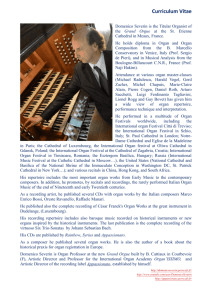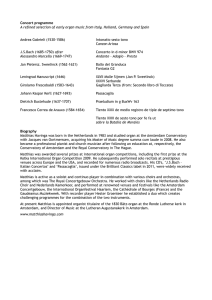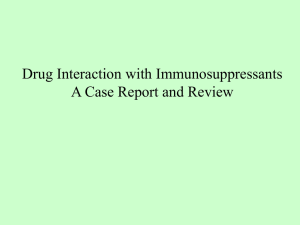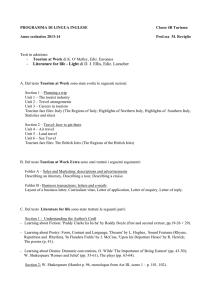transplant tourism and organ trafficking
advertisement
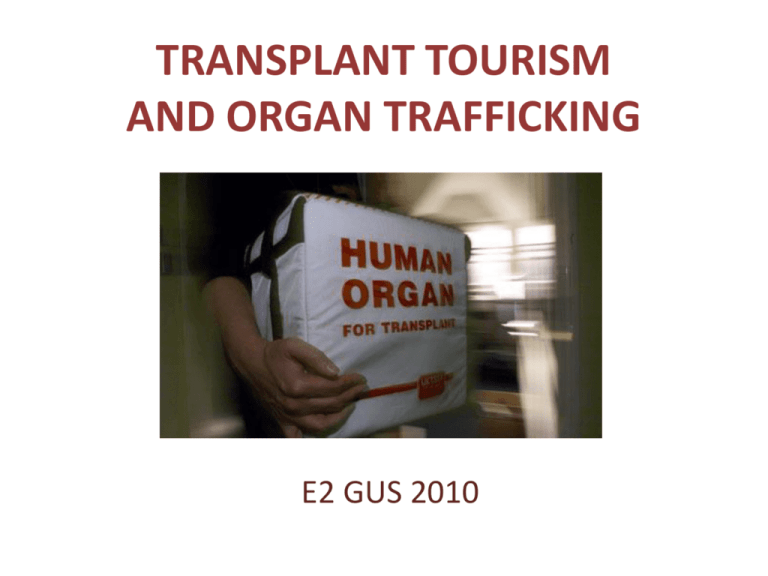
TRANSPLANT TOURISM AND ORGAN TRAFFICKING E2 GUS 2010 Achmad Shidiq Dilla Aprilia Dimas Setiaji Dini Desmona Monika Hasna Mutia Ayu Nadya Iswandari Noer Olivy Nur Afifah Tara Zhafira Wulan Dwi Sakinah E2 (22) “The 20th century miracle” Best treatment The only available treatment • Survival rate ↑ • Cost effective • Quality of life ↑ • For end-stage failure Market and Demand Market and Demand? About 112,600 solid organs transplanted worldwide in 2011. There was 5.1% of increase over 2010. It was only ≤ 10% needs. Global Activity in Organ Transplantation 2011 Estimate (Global Observatory on Donation & Transplantation, 2011) Kidney Liver Heart Lung Pancreas Small Bowel 76.118 23.721 5.741 4.278 2.564 209 The Gap is Widen Data from optn.transplant.hrsa.gov and OPTN/SRTR Annual Report. ** Data include deceased and living donors I need the kidney, I have the money I have the kidney, I need the money Organ Trafficking Recruitment, transport, transfer, harboring or receipt of persons, by means of the threat or use of force or other forms of coercion, of abduction, of fraud, of deception, of the abuse of power, of a position of vulnerability, of the giving or receiving of payments or benefits to achieve the consent of a person having control over another person, for the purpose of exploitation by the removal of organs, tissues or cells for transplantation (UN Trafficking Protocol, 2000) The commercial transaction is a central aspect of organ trafficking; the organ becomes a commodity and financial considerations become the priority for the involved parties instead of the health and wellbeing of the donors and recipients Transplant Tourism Has become a connotation for organ trafficking The purchase of a transplant organ abroad that includes access to an organ while bypassing laws, rules, or processes of any or all countries involved (UNOS) However, not all medical tourism that entails the travel of transplant recipients or donors across national borders is organ trafficking. Transplant tourism may be legal and appropriate. The Real Victims in Organ Trafficking Vulnerable populations (such as illiterate and impoverished persons, undocumented immigrants, prisoners, woman, children and political or economic refugees) in resourcepoor countries. 100 nationals from countries such as 5–10%of kidney transplants performed annually around the globe are currently via organ trade. Saudi Arabia (700 in 2005), Taiwan (450 in 2005), Malaysia (131 in 2004) and South Korea (124 in the first 8 months of 2004) went abroad annually for a commercial kidney transplant. At least 20 nationals from other countries such as the Australia, Japan, Oman, Morocco, India, Canada and the United States traveled as transplant tourists for trafficked organs. China (2006-2007) 11000 transplant were performed from executed prisoners 8000 kidney, 3000 liver, approx 200 are hearts The 8000 kidney transplants alone in China in 2006 would account for at least 10% of the total number of annual organ transplants done in programs of organ trafficking. In Indonesia? • 1st kidney transplant in Ina RSCM, 1977 • In Indonesia 40.000 people need kidney transplant. Only 500 had it. • Kidney donors alive and only a few. Mostly patients underwent the transplant in China (many donors and not so expensive) • Underwent kidney transplant elongated age by 29.9 yrs (Transplant Centre Directory, 1992) • As a medical procedure, organ transplant has a potential to be misused need a regulation, ethically and legally. International Convention and National Regulation The Declaration of Istanbul on Organ Trafficking and Transplant Tourism WHO Guiding Principles on Human Cell, Tissue, and Organ Transplantation UU No 23 Tahun 1992 PP No 18/1981 The Declaration of Istanbul on Organ Trafficking and Transplant Tourism “Organ trafficking and transplant tourism violate the principles of equity, justice, and respect for human dignity and should be prohibited. Because transplant commercialism targets impoverished and otherwise vulnerable donors, it leads inexorably to inequity and injustice and should be prohibited a. Prohibitions on these practices should include a ban on all types of advertising (including electronic and print media), soliciting, or brokering for the purpose of transplant commercialism, organ trafficking, or transplant tourism. b. Such prohibitions should also include penalties for acts, such as medically screening donors or organs, or transplanting organs, that aid, encourage, or use the products of, organ trafficking or transplant tourism. c. Practices that induce vulnerable individuals or groups (such as illiterate and impoverished persons, undocumented immigrants, prisoners, and political or economic refugees) to become living donors are incompatible with the aim of combating organ trafficking, transplant tourism, and transplant commercialism.” WHO Guiding Principles on Human Cell, Tissue, and Organ Transplantation Guiding Principle 5 Cells, tissues and organs should only be donated freely, without any monetary payment or other reward of monetary value. Purchasing, or offering to purchase, cells, tissues or organs for transplantation, or their sale by living persons or by the next of kin for deceased persons, should be banned. The prohibition on sale or purchase of cells, tissues and organs does not preclude reimbursing reasonable and verifiable expenses incurred by the donor, including loss of income, or paying the costs of recovering, processing, preserving and supplying human cells, tissues or organs for transplantation. UU No 23 Tahun 1992 Pasal 33 (1) Dalam penyembuhan penyakit dan pemulihan kesehatan dapat dilakukan transplantasi organ dan atau jaringan tubuh, transfusi darah, implan obat dan atau alat kesehatan, serta bedah plastik dan rekonstruksi. (2) Transplantasi organ dan atau jaringan tubuh serta transfusi darah sebagaimana dimaksud dalam ayat (1) dilakukan hanya untuk tujuan kemanusiaan dan dilarang untuk tujuan komersial. Pasal 34 (1) Transplantasi organ dan atau jaringan tubuh hanya dapat dilakukan oleh tenaga kesehatan yang mempunyai keahlian dan kewenangan untuk itu dan dilakukan di sarana kesehatan tertentu. (2) Pengambilan organ dan atau jaringan tubuh dari seorang donor harus memperhatikan kesehatan donor yang bersangkutan dan ada persetujuan donor dan ahli waris atau keluarganya. (3) Ketentuan mengenai syarat dan tata cara penyelenggaraan transplantasi sebagaimana dimaksud dalam ayat (1) dan ayat (2) ditetapkan dengan Peraturan Pemerintah. PP No 18/1981 BAB V TRANSPLANTASI ALAT DAN ATAU JARINGAN TUBUH MANUSIA (1) (2) (1) (2) Pasal 10 Transplantasi alat dan atau jaringan tubuh manusia dilakukan dengan memperhatikan ketentuan-ketentuan sebagaimana dimaksud dalam Pasal 2 huruf a dan huruf b. Tatacara transplantasi alat dan atau jaringan tubuh manusia diatur oleh Menteri Kesehatan. Pasal 11 Transplantasi alat dan atau jaringan tubuh manusia hanya boleh dilakukan oleh dokter yang bekerja pada sebuah rumah sakit yang ditunjuk oleh Menteri Kesehatan. Transplantasi alat dan atau jaringan tubuh manusia tidak boleh dilakukan oleh dokter yang merawat atau mengobati donor yang bersangkutan. Pasal 12 Dalam rangka transplantasi penentuan saat mati ditentukan oleh 2 (dua) orang dokter yang tidak ada sangkut-paut medik dengan dokter yang melakukan transplantasi. Pasal 13 Persetujuan tertulis sebagaimana dimaksud dalam Pasal 2 huruf a, Pasal 14, dan Pasal 15 dibuat di atas kertas bermaterai dengan 2 (dua) orang saksi. PP No 18/1981 BAB VIII PERBUATAN YANG DILARANG Pasal 17 Dilarang memperjual belikan alat dan atau jaringan tubuh manusia. Pasal 18 Dilarang mengirim dan menerima alat dan atau jaringan tubuh manusia dalam semua bentuk ke dan dari luar negeri. Pasal 19 Larangan sebagaimana dimaksud dalam Pasal 17 dan Pasal Pasal 17 18 tidak berlaku untuk keperluan penelitian ilmiah dan keperluan lain yang ditetapkan oleh Menteri Kesehatan. A 25 yo with no insurance A 65 yo that able to pay all cost To which person will you give the kidney? Why? Conclusion • Organ transplant tindakan yang mulia, tapi hanya boleh dilakukan dengan consent dari donor dan memperhatikan risiko donor, efektivitas pendonoran, kemungkinan keberhasilan pada penerima, serta ada tidaknya unsur “jual beli” atau komersialisasi di dalamnya. • Secara legal, Indonesia bersama negara lain menentang adanya organ trafficking maupun transplant tourism. Thank you! “we make a living by what we get, but we make a life by what we give” -Winston Churchill References • • • • • • • http://organdonor.gov/about/data.html Delmonico FL. The development of the Declaration of Istanbul on Organ Trafficking and Transplant Tourism. Nephrol. Dial. Transplant. (2008) 23 (11): 3381-3382. Budiani-Saberi DA, Delmonico FL. Organ Trafficking and Transplant Tourism: A Commentary on the Global Realities. American Journal of Transplantation 2008; 8: 925–929. Tazeen H. Jafar, MD, MPH. Organ Trafficking: Global Solutions for a Global Problem. American Journal of Kidney Diseases, Vol 54, No 6 (December), 2009: pp 1145-1157 The Declaration of Istanbul on Organ Trafficking and Transplant Tourism. http://cjasn.asnjournals.org/content/3/5/1227.full http://www.balitbangham.go.id/PERANGKAT%20UU%20TERKAIT/UU.%2023.pdf http://hukum.unsrat.ac.id/pp/pp_18_1981.htm
